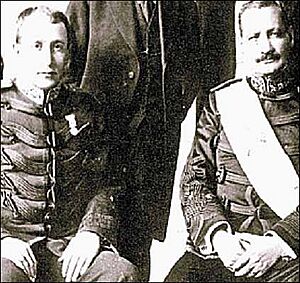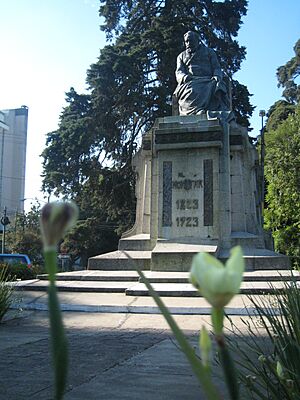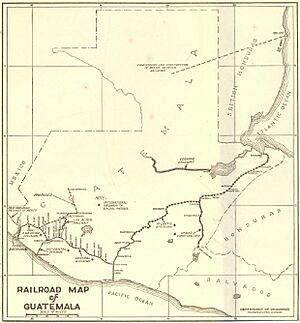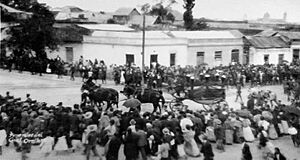José María Orellana facts for kids
Quick facts for kids
General of Division
José María Orellana Pinto
|
|
|---|---|
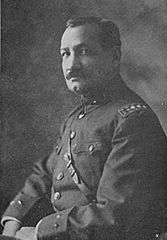
José María Orellana's portrait in 1925
|
|
| President of Guatemala | |
| In office 10 December 1921 – 26 September 1926 |
|
| Preceded by | Carlos Herrera |
| Succeeded by | Lázaro Chacón González |
| 16th First Vice President of Guatemala | |
| In office 8 December 1921 – 28 April 1922 |
|
| President | Carlos Herrera y Luna |
| Preceded by | José Ernesto Zelaya |
| Succeeded by | Jorge Ubico |
| Personal details | |
| Born | 11 July 1872 El Jícaro, El Progreso, Guatemala |
| Died | 26 September 1926 (aged 54) Antigua Guatemala, Guatemala |
| Political party | Liberal |
| Nicknames | Don Chema Rapadurero |
| Military service | |
| Allegiance | |
| Rank | general |
José María Orellana Pinto (born July 11, 1872 – died September 26, 1926) was an important leader in Guatemala. He was a general in the army and later became the President of Guatemala. He served as president from 1921 to 1926.
Orellana became president after a military takeover against the previous president, Carlos Herrera. During his time as president, a new money system was created for Guatemala. This new money was called the Quetzal. José María Orellana died in 1926 when he was 54 years old. He was buried with special honors in Guatemala City.
Contents
Early Life and Career
José María Orellana Pinto was born in El Jícaro, El Progreso. His parents were Esteban Orellana and Leonora Pinto. He chose a career in the military and became a General in the Guatemalan Army.
Orellana was also elected to the Guatemalan legislature many times. He was a member of the Liberal Party. He worked as the Chief of Staff for President Manuel Estrada Cabrera. In 1907, he was with President Estrada Cabrera when someone tried to attack the president with a bomb. Both Orellana and the president were safe.
Taking Power: The Coup of 1921
On December 5, 1921, General Orellana led a military takeover. This action was supported by the United Fruit Company. The coup was against President Carlos Herrera. President Herrera had not wanted to approve special deals for the United Fruit Company. These deals had been made by the president before him, Manuel Estrada Cabrera. Orellana had help from other army officers, including General Jorge Ubico.
Presidency
After the takeover, Orellana became the Interim President on December 5, 1921. He later won the elections and became the official president. During his time in office, he approved the deals that the previous government had made with the United Fruit Company (UFCO). President Herrera had refused to approve these deals.
Orellana also tried to create a union of three countries: Guatemala, Honduras, and El Salvador. However, this plan did not work out. In 1923, a monument was built in Avenida Reforma to honor Dr. Lorenzo Montúfar y Rivera. He was a famous writer and thinker.
Economy and Business Deals
Orellana made many business deals during his presidency. For example, he sold the right to collect gum raw material from the Petén region to Percy W. Shufeldt. Unlike the president before him, Orellana gave good deals to foreign companies.
Another example was the Electric Company. This company had been taken from German owners after World War I. Orellana's government sold it to an American company called American Bond and Share Company in 1922.
Orellana also supported building many kilometers of railways. He was pressured by the International Railways of Central America (IRCA) to approve a railroad contract. This contract had been signed in 1908 by President Manuel Estrada Cabrera. When Estrada Cabrera was removed from power, IRCA wanted this agreement to be put into action. However, President Carlos Herrera did not agree. After Herrera was overthrown, Orellana approved the contract on March 10, 1922.
During his time as president, the Guatemalan Congress passed several important laws:
- They approved the Central American Union Covenant. This was an agreement made in San Jose, Costa Rica.
- They approved a contract for electricity services in Guatemala City. This was between the government and the Central America Power Company.
- They passed a law about hydrocarbons (oil and gas).
- They approved a contract to install an electric tram in Guatemala City.
- They approved a contract to build a public telegram office in Guatemala City.
- They approved a contract with a German company to finish the Los Altos Railway and the Santa María power plant.
- They approved contracts for US companies to look for oil.
- They passed a Work Act.
- They supported the growth of a national soap industry.
Challenges with the United Fruit Company
Orellana's government faced challenges with the United Fruit Company (UFCO).
- Dockworkers' Strike: In 1924, workers in Puerto Barrios went on strike. These workers were very important for moving bananas. They wanted an 8-hour workday and higher pay. UFCO refused, so the workers went on strike. All the workers on UFCO farms supported them. UFCO asked the Guatemalan government for help. Orellana quickly sent soldiers to Puerto Barrios to stop the strike. There was fighting, and many workers were hurt or died. The strike lasted 27 days. The government arrested 22 strike leaders and made them leave the country.
- Railroad Strike: Later in 1924, employees of the International Railways of Central America (IRCA) also went on strike. They wanted shorter work hours, higher wages, and respect for their labor union. Again, UFCO refused their demands. They ordered Orellana's government to use force to stop the strike of five thousand workers.
Death
On May 25, 1926, a newspaper called El Imparcial reported that "Martial law" had been put in place. This meant President Orellana had stopped some individual rights in the Constitution. The government said this was because some people were trying to cause trouble and stop the country's progress. After May 26, El Imparcial stopped publishing. Only official news could be shared.
Then, on September 26, Orellana died suddenly. He was on a vacation trip in Antigua Guatemala and was staying at a hotel. The official news said he died from a "violent angina attack." However, because of the strange situation, some people thought he might have been poisoned. General Lázaro Chacón became the interim president. He quickly ended martial law and allowed private newspapers to be published again.
See also
 In Spanish: José María Orellana para niños
In Spanish: José María Orellana para niños
 | William M. Jackson |
 | Juan E. Gilbert |
 | Neil deGrasse Tyson |


